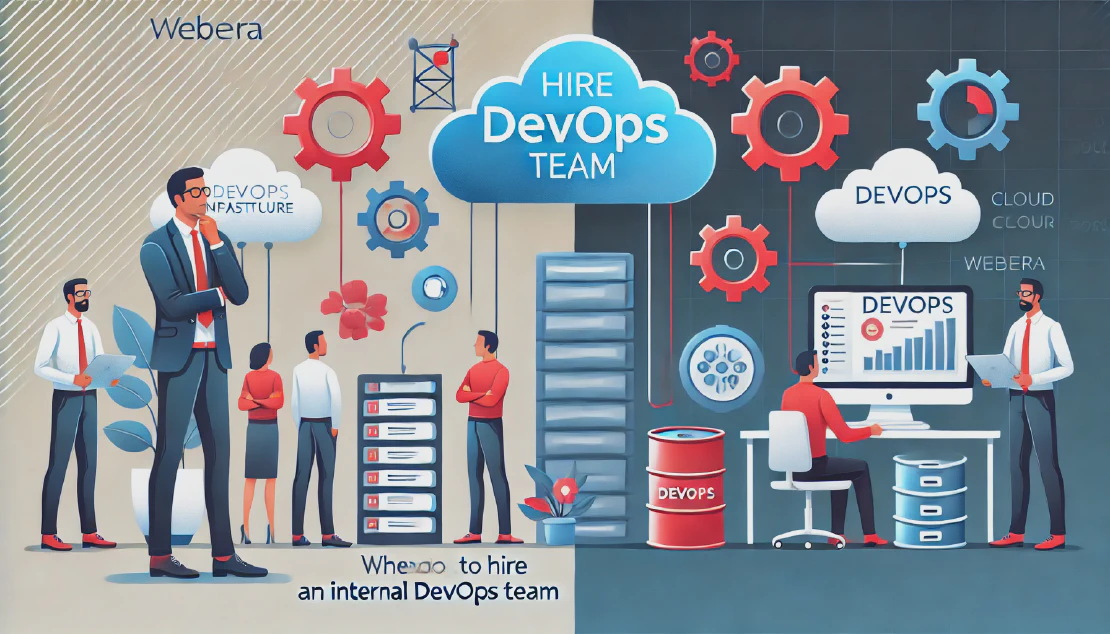The DevOps Dilemma Every Growing Company Faces
Imagine this: Your startup just closed a major client, and suddenly your application traffic doubles overnight. Your servers are struggling, deployments are failing, and your developers are spending more time putting out fires than building features. You know you need DevOps expertise—but should you hire a full-time engineer, build an entire team, or is there a more strategic approach?
I’m Joel Zamboni, and after two decades in the trenches of infrastructure and development, I’ve helped countless companies navigate this exact challenge. That’s why we created DevOps on Demand at Webera—to provide expert DevOps support without the commitment of full-time hires. But I’ll be the first to admit: sometimes, building an in-house team is the right call. Let’s break down how to make this critical decision.
The Real Cost of Building an In-House DevOps Team
Hiring full-time DevOps talent involves more than just salaries. Here’s what you’re actually committing to:
Significant Investment: A qualified DevOps engineer commands $150K+ annually in competitive markets, plus benefits, equipment, and training. For a proper team, multiply that several times over.
Extended Recruitment Timeline: The hiring process—from posting to onboarding—typically takes 3-6 months for specialized technical roles, during which your infrastructure needs remain unaddressed.
Capacity Planning Challenges: If your DevOps workload fluctuates (as it does for most companies), you’ll inevitably pay for capacity you’re not using during quieter periods.
As for the freelancer route? While it offers flexibility, it comes with significant risks: inconsistent availability, varying quality standards, and potential security vulnerabilities when temporary contractors have access to your systems.
When Building an In-House DevOps Team Makes Sense
There are clear scenarios when investing in a dedicated DevOps team is the right strategic move:
Infrastructure IS Your Product: If you’re building a cloud platform, a SaaS product with complex deployment needs, or infrastructure tooling, DevOps isn’t just support—it’s core to your value proposition.
Enterprise-Scale Operations: Organizations operating globally with millions of users and complex compliance requirements often benefit from dedicated teams that understand the nuances of their specific infrastructure.
Highly Specialized Technology Requirements: If you’re working with unusual tech stacks, custom hardware integration, or industry-specific compliance frameworks that require deep, constant attention.
If you recognize your organization in these scenarios, building an in-house team likely provides the best long-term value—though even then, supplementing with on-demand expertise during peak periods can be smart.
When DevOps On-Demand Delivers Better ROI
For most growing companies, DevOps on Demand provides a more efficient solution, particularly when:
You’re Optimizing Cash Flow: You need professional DevOps expertise, but allocating full-time salaries would strain your runway or investment in other critical areas.
Your DevOps Needs Fluctuate: Some months involve major infrastructure changes or scaling challenges, while others are relatively stable. On-demand support lets you scale expertise with your actual needs.
You Need Diverse DevOps Specializations: DevOps encompasses cloud architecture, security, CI/CD, monitoring, and more. On-demand gives you access to specialists across all these domains rather than the limited skill set of one or two individuals.
Speed to Implementation is Critical: When you need expertise immediately rather than after a lengthy hiring process.
Real-World Impact: The Flexibility Advantage
At Webera, we’ve seen firsthand how DevOps on Demand transforms organizations’ ability to execute quickly and efficiently. While respecting client confidentiality, the pattern is clear: companies using on-demand DevOps support typically achieve:
- 40% faster deployment cycles through automated CI/CD pipelines and infrastructure optimization
- 30-40% cost reduction compared to maintaining equivalent in-house capacity
- Significantly improved reliability metrics with proper monitoring, alerting, and incident response protocols
These benefits come not just from technical implementation but from the strategic flexibility to access the right expertise exactly when needed.
How DevOps on Demand Actually Works
The DevOps on Demand model is designed for simplicity and impact:
Streamlined Request System: Submit DevOps tasks through GitHub issues, Jira tickets, or your preferred project management tool—from “Fix our database performance” to “Set up a complete CI/CD pipeline.”
Response Time Guarantee: Most standard requests are addressed within 48 hours, with urgent issues handled within 24 hours on premium tiers.
Specialized Expertise On Tap: One week you might need Kubernetes assistance, the next week security hardening—the on-demand model gives you access to specialists across the DevOps spectrum.
Knowledge Transfer Built-In: Unlike temporary contractors, the on-demand model includes documentation and knowledge sharing to build your team’s capabilities over time.
It’s not just emergency support—it’s a strategic partnership that evolves with your infrastructure needs.
Making the Right Decision for Your Organization
When evaluating your DevOps strategy, consider these practical questions:
Utilization Analysis: Can you keep a full-time DevOps engineer or team fully utilized, or would they experience significant downtime?
Timeline Assessment: Do your immediate infrastructure needs allow time for a recruitment process, or do you need expert assistance now?
Expertise Requirements: Do you need consistent access to a broad range of DevOps specializations, or primarily focused expertise in one area?
Financial Modeling: Have you compared the fully-loaded cost of hiring versus the subscription-based model of DevOps on Demand?
For most companies in growth mode, the flexibility, breadth of expertise, and cost-effectiveness of the on-demand model delivers superior ROI compared to building a team from scratch.
Take the Next Step in Your DevOps Journey
If you’re wrestling with infrastructure challenges and unsure about the best path forward, let’s have a conversation about your specific needs:
Start with a trial: Experience DevOps on Demand with a 7-day proof-of-concept focused on your most pressing infrastructure issue.
Schedule a consultation: Book a meeting with me to discuss your infrastructure challenges.
Email us directly: Reach out to hello@webera.com with questions about how DevOps on Demand might fit your organization.
No high-pressure sales tactics—just a straightforward discussion about whether our approach aligns with your needs.
In the meantime, consider calculating the hours your development team currently loses to DevOps-related tasks. That number often makes the path forward remarkably clear.
Here’s to building infrastructure that empowers rather than constrains your innovation,

